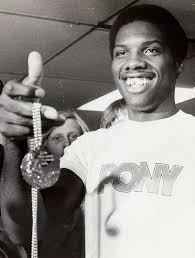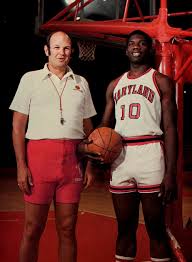The NBA Finals date back to 1947 (when they were known as the Basketball Association of America Finals) and the very 1st NCAA tourney was held in 1939. Olympic basketball competition is even older: it debuted as a demonstration event in 1904 and the men’s version became a medal sport in 1936, with the women finally getting their chance to go for the gold in 1976. The United States has dominated Olympic basketball competition from the start: the men have won 15 gold medals in the 18 tournaments they have participated in during the past 84 years, while the women have won 8 gold medals in the 10 tournaments in which they have competed during the past 44 years. Those of you who were looking forward to the 2020 Olympics opening ceremonies in Tokyo on July 24, 2020 will have to wait an extra 364 days, as the coronavirus caused a postponement until July 23, 2021. Due to the absence of college basketball since mid-March, HoopsHD’s Jon Teitel decided to fill the void by trying to interview as many prior Olympic players/coaches as possible so that you have something to read this summer while not watching the Summer Games. We continue our coverage by chatting with Steve Sheppard and his college coach Lefty Driesell about Steve winning a gold medal in 1976.
You were nicknamed “Bear”: who gave you the nickname, and how did you like it? Steve Sheppard: My friend Kenny gave it to me during the 5th grade after he moved from the Bronx to Queens. Lefty Driesell: We had a big fan with a big voice so whenever Steve came into the game or did something he would just yell out “Bear”!
You were born/raised in New York City: how did you end up in College Park? SS: 1 of their assistant coaches came up to NYC to recruit me: he talked about playing on national TV in the ACC against teams like UNC. When I came down on my visit it was great to walk into a beautiful arena like Cole Field House. Lefty talked about also playing against teams like UCLA and I was thrilled by that. As soon as I got out of high school I went to Hawaii with Tommy Henderson: we had played together as kids but after looking at their schedule/players I thought about it and decided to leave. LD: He was a great player in NYC. I think that he actually signed with Hawaii and went there in the summertime but did not like it. He called me up and asked me if he could come to Maryland and I said yes. He and Adrian Dantley were 2 of the best players in the country but played the same position. I tried to get both of them but I am unsure if they ever discussed it with each other.
In the 1975 NCAA tourney you beat Creighton/Notre Dame before losing to Louisville: how close did you come to making the Final 4? SS: It was a very close game right up until the end when they broke the game open in the final minutes thanks to Phil Bond even though he was not their main guy. LD: Louisville ended up losing by 1-PT to UCLA in OT so that could have been us. They had Junior Bridgeman, who played really well against us.
In 1976 you were named to the All-ACC Tournament 2nd-team: what kind of home-court advantage did you have while playing in Landover? SS: Not much because we had only played there a couple of times previously. It was more like a neutral court. LD: I thought that we had a great team but we did not make the NCAA tourney because back then you had to win the ACC tourney to become eligible.
You made the 1976 Olympic team: how much pressure was there on the team after losing to the Soviets in 1972? SS: To be honest we were not really thinking about the Russians: we were just going there to win. I did not care who we played: when the game was over I did not cling to it and just cared about who we played next. LD: Dean Smith was the coach and he picked Steve because he played so well for me despite coming off the bench as a substitute. He could have chosen anyone in America but I remember Dean telling me how impressed he was with Steve giving us a lift. He probably averaged more PTS off the bench (16-17 PPG) than anyone else I ever coached.
What did it mean to you to represent your country, and what did it mean to you to win a gold medal? SS: It was definitely a privilege to be on that team. I used to hold camps and told the kids that marching into the stadium while they played the national anthem was a heck of a feeling. To be a kid from the Bronx among the best athletes in the world was outstanding. As a kid I would watch “Wide World of Sports” and after winning a gold medal I finally fit into the category of the best athletes in the world. LD: I am sure it was great. He was not a very good student during high school: I asked him how many hours/day he spent studying and he did not understand what I meant. I had him room with John Lucas who was a very good student and had a father who worked at a school. As a senior Steve was named Academic All-ACC. I had had some Rhodes Scholars before but not many of them have been named Academic All-ACC. When he told me that he was thinking of getting his Masters’ degree rather than going to the NBA, I almost fainted!
In the summer of 1977 you were drafted 30th overall by Chicago (8 spots behind Norm Nixon): did you see that as a validation of your college career, or the realization of a lifelong dream of reaching the NBA, or other? SS: It was sort of disappointing to go in the 2nd round but I got hurt during my senior season and did not come back until the ACC tourney so it was a little bittersweet. I had a 2-year guaranteed contract to play with my idol Tiny Archibald in Kansas City while Chicago offered me no guarantee. I wish I could have played with Tiny: I knew him from childhood and it would have been a better deal for me. Had Jerry Sloan got the coaching job the very next year it would have been great but Larry Costello got the job instead and it was not the ideal situation for me. LD: I am sure that it meant a great deal to him even though he did not become a star in the NBA. Everybody liked/respected him, especially the people who had to guard him.
You played 2 years in the NBA and then 3 years overseas: how did pro basketball compare to college basketball? SS: The big men were bigger/better/quicker: they were more agile and could jump higher. LD: He was small for his position. He was an inside player like Dantley: he was a great rebounder and did not often shoot from outside. They both played hard and were mean/tough, which allowed them to rebound inside and then score on put-backs. I dreamed of having both of them on my team.
Since retiring from basketball you moved back to Prince George’s County to work for the school system and coach basketball: could you have imagined back in your playing days that you would get into coaching? SS: I like the kids and try to help fulfill their dreams. Most of the kids at my camp were not listening and did not work hard: they just came to play for fun or their parents made them come, unlike the kids at a specialty camp who really wanted to be good. LD: Yes: he knew the game and always played so hard. To average 9 RPG off the bench was just incredible.
When people look back on your career, how do you want to be remembered the most? SS: I was a real hard-nosed player and when I stepped onto the floor I was definitely serious about what I was doing. We were enemies on the court until the game was over. I do not watch the game now because I have seen so many guys destroyed by basketball when it does not work out. I always had the attitude of doing something totally different when my time was up: I would not even go to a game if they gave me free tickets. Even at the camps I would hardly touch the ball besides doing a quick demonstration: I let it go and that was it. LD: I am proud of him for making Academic All-ACC. He rebounded hard for a 6’6” forward and we won 65 games during his 3 years here: I always judge a guy by how many games he won. He definitely should have his jersey hanging up in the XFINITY Center: he played on a pair of top-15 teams and won a gold medal. He was a great young man who earned his degree.




